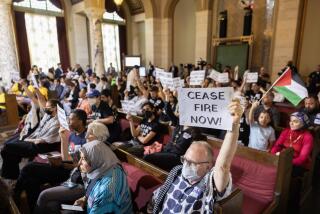Debate on Jerusalem Strains Relations for Christians, Jews
- Share via
Even as Israel and the Palestinian Authority cautiously mark a new accord this week over the withdrawal of most Israeli troops from the biblical city of Hebron, there is a growing rift between Christians and Jewish groups over the future of Jerusalem.
Major American churches are mounting a campaign challenging Israel’s claim to Jerusalem as its undivided capital, in the process drawing fire from two leading rabbis--one an American, the other Israeli--who have been key players in strengthening Christian-Jewish relations.
Next week, Churches for Middle East Peace--a Washington-based coalition that includes the National Council of Churches and leading old-line Protestant denominations--plans a mailing to all members of Congress urging support for a “shared Jerusalem.”
That follows last month’s stepped-up public relations campaign targeting the Clinton administration, in which the group sponsored a full-page newspaper ad--signed by more than 600 church leaders--calling on the U.S. to reject “exclusivist claims” to Jerusalem.
“Jerusalem at peace cannot belong exclusively to one people, one country or one religion,” the ad said.
Israel’s official policy is that Jerusalem will be its undivided capital forever. But Palestinians want traditionally Arab East Jerusalem--captured by Israel from Jordan during 1967’s Six-Day War--as the capital of a future Palestinian state.
Noticeably absent from the church coalition were leading evangelical churches and organizations and Roman Catholic bishops. Nonetheless, the predominately old-line Protestant campaign has stirred the ire of rabbis active in the interfaith movement.
“Ill try to be diplomatic. I would hope . . . this latest episode won’t permanently set back mainline church-Jewish relations, but we have very severe differences,” said Rabbi A. James Rudin, national inter-religious affairs director of the American Jewish Committee in New York. At the moment, he said, relations are frayed.
Rudin decried the church campaign in a column distributed nationally by Religion News Service.
Similar criticism came from Rabbi David Rosen, a Jerusalem-based member of an Israeli commission that helped forge diplomatic relations with the Vatican. He is currently president of the World Conference on Religion and Peace, a worldwide interfaith body.
“It doesn’t help,” Rosen said during a visit to Los Angeles last week to speak at an Anti-Defamation League conference. “Attempts to try to prejudge the outcome in terms of negotiations is always counterproductive. You force people into actually more rigid positions instead of allowing for greater flexibility of the issue.”
The exchange was yet another reminder that, as tortuous as the Hebron negotiations were, they pale in comparison to the volatile disputes that surround the future of Jerusalem--a city revered by Jews as the site of the temple that held the Ark of the Covenant delivered by God to Moses, by Christians as the site where Jesus Christ redeemed humankind on a Roman cross, and by Muslims as a city where the Prophet left his footprint on earth and ascended to the Seventh Heaven.
*
Officials at Churches for Middle East Peace said they will not be deterred by the criticism. The organization--which has an annual budget of just $55,000--is raising funds for more newspaper ads.
“I think there is a real need for a recognition that Christianity, as one of the three faiths involved in the future final status negotiation on Jerusalem, does have a right to call for a shared Jerusalem,” said Terence W. Miller, chairman of the group and director of Maryknoll Fathers and Brothers Justice and Peace Office in Washington.
Christian churches--Protestant, Orthodox and Roman Catholic--have long said they should have a voice in shaping the future of Jerusalem. Their primary concern has been continued access to holy sites, guaranteed by an international agreement.
But church leaders said they feared hopes for peace in the Middle East would be dashed by Israeli-Palestinian violence last year after what the churches complained was “exclusivist” claims on Jerusalem by Israel. Miller cited the building of Jewish settlements on the West Bank and in East Jerusalem and the opening by Israel last September of an ancient tunnel near the Temple Mount in the city’s Arab quarter, touching off violence that resulted in 75 deaths.
“Those claims needed to be confronted with a Christian response for a shared Jerusalem,” Miller said.
He denied that the church group is prejudging negotiations, saying Churches for Middle East Peace is not advocating a specific plan for Jerusalem, only advancing a principle of sharing.
But Rabbi Rosen said U.S. churches are doing the bidding of Palestinian Christians for partisan, political reasons.
There has never been more religious freedom and access to holy sites for members of all faiths, Rosen said, than under Israeli administrations. Before the 1967 war, many of the most sacred sites were under Jordanian control and Jews, he noted, were prohibited from praying at the wall that remained standing after destruction of the Second Temple in the year 70.
*
‘So within that context,” he said, “a statement like that made by the mainline Protestant churches is obviously being encouraged by the local Protestant churches in Jerusalem in order to score brownie points with their Muslim brothers within Palestinian society in order to show [that] Christians are in fact on the right side and pushing for a political interest that serves the Palestinian nation.”
He conceded that Palestinian Christians on the West Bank have been denied access to Jerusalem during times of civil unrest. But that is a matter of Israeli security, he insisted, not the denial of religious freedom.
How successful the church group will be remains to be seen. Its officials said the Clinton administration so far has not responded to its appeals and the Senate Foreign Relations Committee failed to raise the “shared Jerusalem” issue, as the church group asked, during last week’s confirmation hearings for Secretary of State-nominee Madeleine Albright.
More to Read
Sign up for Essential California
The most important California stories and recommendations in your inbox every morning.
You may occasionally receive promotional content from the Los Angeles Times.










